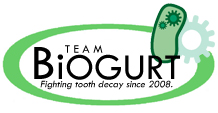Team:MIT
From 2008.igem.org
| Line 5: | Line 5: | ||
[[Image:MitBanner.jpg|center]] | [[Image:MitBanner.jpg|center]] | ||
| - | |||
| - | |||
| Line 17: | Line 15: | ||
!align="center"|[[Team:MIT/Notebook|Notebook]] | !align="center"|[[Team:MIT/Notebook|Notebook]] | ||
|} | |} | ||
| + | |||
<hr class=divider> | <hr class=divider> | ||
Revision as of 20:00, 24 June 2008
Project DescriptionOur goal is to engineer yogurt to prevent cavities. Teeth are covered in a complex biofilm containing many types of bacteria and glycoproteins. Of all the bacteria found in the biofilm, only one strain, Streptococcus mutans is harmful. S.mutans attatches to a glycoprotein in the biofilm, forms colonies, takes in sugars, and secretes lactic acid which breaks down the enamel of the teeth, causing dental cavities. A clinical study (Kelly CG et al.; Nature Biotechnol. 1999) isolated the protein that S.mutans uses to attach to the teeth and isolated the 20aa functional segment (p1025) that actually binds to the glycoproteins. p1025 competitively inhibits the binding of S.mutans, causing other (unharmful) bacteria to grow in its place. This was found to prevent the recolonization of S.mutans for about 90 days. We are engineering Lactobacillus bulgaricus, a bacteria commonly found in yogurt, to produce this peptide. Although the peptide could be commercially added to the yogurt, the independent production of this peptide by l.bulgaricus will enable continuous production and remove the need for outside infrastructure. Since a new batch of yogurt is made by using the bacteria from a small saved amount of the old batch, a continuous supply of teeth-cleaning yogurt will be made available. | |||||||||
|
| |||||||||
| Home | The Team | The Project | Parts Submitted to the Registry | Modeling | Notebook |
|---|
 "
"

